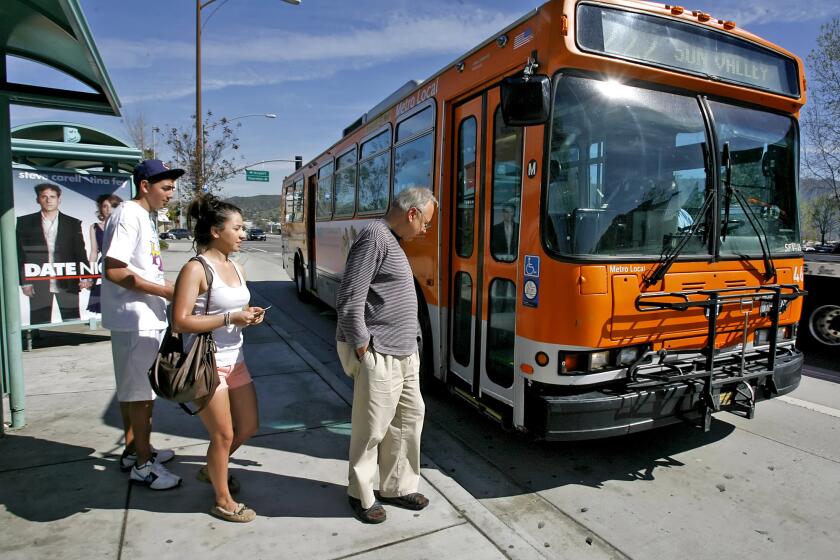Plan OKd to Keep Buses Running in RTD Strike
Pushing the RTD to get tough with its drivers union, the Los Angeles County Transportation Commission on Wednesday voted to require, for the first time, that the transit district use management personnel to keep hundreds of buses running in the event of a strike later this year.
Should drivers walk out, the commission, which controls the purse strings for all transit systems in the county, also agreed to make additional money available to enable other municipal and private transit bus operators, some of which use non-union drivers, to increase their service.
Many transit officials are predicting a strike later this year because of disputes over expiring multiyear labor contract provisions that have contributed to high absenteeism and other costly problems.
Value Debated
Together, Wednesday’s actions could assist tens of thousands of transit riders, although to what degree was a matter of debate.
Commission staffers said the Orange County Transit District was able to continue a third of its service during a recent drivers strike, and they estimated that the RTD should be able to operate 15% of service, or about 300 rush-hour buses.
However, Earl Clark, head of the 5,000-member RTD bus drivers union, said the commission was “trying to set up some type of . . . strikebreakers,” and predicted that the proposed skeletal bus service plan would be immediately overloaded by hundreds of thousands of RTD riders, creating safety problems and chaos at stops.
RTD officials, who had sought a delay in Wednesday’s commission actions, also said there could be problems.
“We don’t know if it is reasonable or feasible to expect us to operate 15% of our service,” said Leila Procopio, an RTD spokeswoman. “There are a lot of major implications of this policy that are not being considered. . . . We were told that (during the Orange County strike) there were problems with striking drivers harassing (replacements).”
But commission chairman and county Supervisor Pete Schabarum, who pushed the proposals, said they are merely the type of strike contingency plans made routinely by most public agencies and private businesses when facing a work stoppage.
Although Schabarum said little during Wednesday’s debate, he previously told The Times that a new requirement to maintain service is needed because the RTD and its drivers “have chosen to leave the public without public transportation” during five strikes over the last 15 years. The longest of those ran 68 days in 1974.
Wednesday’s action, approved on a 10-1 vote, is part of a bold and controversial conservative agenda that Schabarum has set for the commission in a pivotal year for the future of Los Angeles transit management.
For example, the commission also approved Wednesday a Schabarum-inspired proposal to reduce operating funds for the RTD if it does not win concessions in new labor agreements to permit contracting out services and to strengthen management rights to control employees and costs.
Schabarum’s initiatives are winning support in part because a majority of commissioners are ready to assert more of their power over RTD purse strings after two years of disclosures of alleged waste and management at the transit district.
Critics of the RTD say the agency’s labor contracts, which include provisions carried over from decades of agreements, are anachronisms that must change if the agency is to significantly improve its efficiency.
Drivers union leaders deny this, although they acknowledge that some “reasonable” changes are politically necessary. But those same union leaders are walking a tightrope with their members.
Overall, Clark said Schabarum’s aggressive tactics toward the union are making it more difficult to avoid a strike. Instead of planning for a strike and ordering controversial contract changes, Clark said, RTD and commission management should be “talking about resolving issues without a work stoppage. If we can . . . that’s what (union leaders) intend to do.”
But Schabarum said RTD officials have not demonstrated in the past that they can extract the necessary labor agreement changes, and his efforts are designed to “assist them in their job.”
More to Read
Start your day right
Sign up for Essential California for news, features and recommendations from the L.A. Times and beyond in your inbox six days a week.
You may occasionally receive promotional content from the Los Angeles Times.






